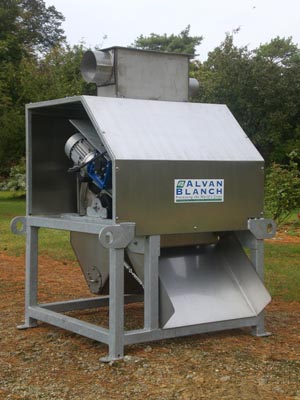
A new slurry separation machine, the Roller Screen 500, has been developed and launched by UK manufacturers Alvan Blanch Development Co Ltd.
With throughputs of up to 60m³/hour, the system efficiently separates solids from agricultural and industrial slurry by means of a unique action in which product passes between rubber compression rolls and a perforated stainless steel drum to deliver stable, stackable solids of up to 30% dry matter.
Independent slurry consultant Simon Johnston says: "The Roller Screen 500 has been in field tests for a year and one machine has already been working efficiently for 4,800 hours. Its benefits include reduced storage, better liquid quality and solid waste that's easier to handle and to distribute.
"As well as these practical benefits to dairy farm efficiency, the separation of solids from slurry has real benefits to the environment in terms of reduced greenhouse gas emissions and less leaching of nitrates into water courses."
Andrew Blanch, Managing Director of Alvan Blanch explains: "We have used the benefit of our experience in this field to develop a completely new separator which is exactly what dairy farmers in Europe have been looking for – a cost effective machine that delivers a consistent end product, day in day out.
"We have engineered reliability into every aspect of the machine – from the robust hot dip galvanised frame and stainless steel internal components to the high quality motors and triple sealed bearings.
"The separator is also compact and adaptable, to suit any site. Alvan Blanch can also offer full system design and installation services."
"We have been astonished by the level of interest in the machine, especially from those who have witnessed demonstrations. Firm orders have already exceeded our most optimistic projections for this year and these have included exports to Germany.
The machine costs £7,700 ex works and Mr. Blanch says: "It's the most cost-effective slurry management system available, so it's a good investment for farmers with units from 100 cows upwards."
